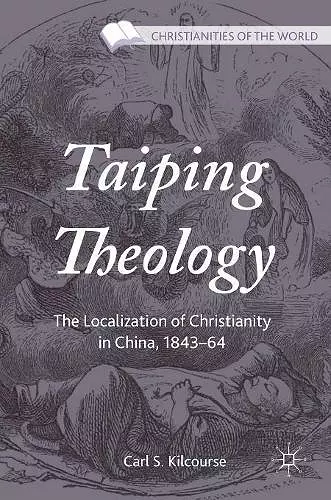Taiping Theology
The Localization of Christianity in China, 1843–64
Format:Hardback
Publisher:Palgrave Macmillan
Published:27th Sep '16
Should be back in stock very soon

"This book successfully places the Taiping Rebellion in the context of modern Chinese history. Ingeniously allowing the Taipings to speak for themselves, Kilcourse shows how the interaction of Christianity and Confucianism together produced a nativist impetus for revolutionary change. The book also demonstrates how Christianity, far from always initiating a universal form of cultural imperialism, usually transformed itself in response to the new cultural worlds in which Christians found themselves." (Benjamin Elman, Gordon Wu '58 Professor of Chinese Studies and Professor of East Asian Studies and History, Princeton University, USA) "Carl Kilcourse's highly original study enables us to see the Taipings for what they actually were: Chinese Christians who read the Bible through radically monotheistic and also Confucian lenses. The result was a uniquely Chinese style of Christianity that combined elements reminiscent of Unitarianism, Pentecostalism, and African Instituted Churches, as well as theologies of liberation grounded in the book of Exodus. Of course, missionaries did not approve of the mixture, but Kilcourse has rescued the Taipings from the scrap-heap of religious eccentricity. Now we must take them seriously." (Brian Stanley, Professor of World Christianity, University of Edinburgh, UK) "This is an outstanding piece of revisionist scholarship on one of the most dramatic events in world history. It is well researched, thoughtfully conceptualized, and designed to stay on the author's target. Kilcourse does not aim to refight the Taiping war, but instead to view it as a religious phenomenon. He is convincing in his argumentation for his own views. This work will provide plenty of material to engage China scholars for decades to come." (Daniel Bays, Professor Emeritus, Calvin College, USA)
This book examines the theological worldview of the Taiping Rebellion (1850–64), a Chinese revolutionary movement whose leader, Hong Xiuquan (1814–64), claimed to be the second son of God and younger brother of Jesus.
This book examines the theological worldview of the Taiping Rebellion (1850–64), a Chinese revolutionary movement whose leader, Hong Xiuquan (1814–64), claimed to be the second son of God and younger brother of Jesus. Despite the profound impact of Christian books on Hong’s religious thinking, previous scholarship has neglected the localized form of Christianity that he and his closest followers created. Filling that gap in the existing literature, this book analyzes the localization of Christianity in the theology, ethics, and ritual practices of the Taipings. Carl S. Kilcourse not only reveals how Confucianism and popular religion acted as instruments of localization, but also suggests that several key aspects of the Taipings’ localized religion were inspired by terms and themes from translated Christian texts. Emphasizing this link between vernacularization and localization, Kilcourse demonstrates both the religious identity of the Taipings and their wider significance in the history of world Christianity.
“Taiping Theology achieves its author’s aim of presenting the religious beliefs of the Taiping movement as a form of localized Chinese Christianity. … It will be useful reading for specialists and advanced students in modern history, Chinese religions, and Christian missions and world Christianity.” (Ryan Dunch, China Review International, Vol. 23 (4), 2016)
ISBN: 9781137543141
Dimensions: unknown
Weight: unknown
281 pages
1st ed. 2016